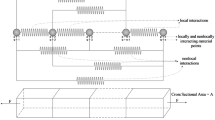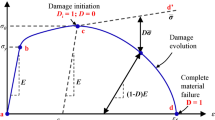Abstract
In this paper, the statistical inference for system stress-strength reliability with bounded strength is discussed. When the stress and strength variables follow the three-parameter Exponentiated-Weibull distributions with unequal scale and shape parameters, the maximum likelihood estimator (MLE) and bootstrap-p confidence interval for system reliability are derived. In addition, combining the score equations which are got by taking the first derivative of the log-likelihood function with respect to the model parameters, the modified generalized pivotal quantity for the system reliability is obtained. After that, two point estimators and a modified generalized confidence interval based on the modified generalized pivotal quantity for the system reliability are derived. Monte Carlo simulations are performed to compare the performances of the proposed point estimators and confidence intervals. Finally, a real data analysis is provided to illustrate the proposed procedures.
Similar content being viewed by others
References
Hu L, Yue D, and Ma Z, Availability analysis of a repairable series-parallel system with redundant dependency, Journal of Systems Science and Complexity, 2020, 33(2): 446–460.
Xu X, Wang R, and Gu B, Statistical analysis of two-parameter generalized BS-logistic fatigue life distribution, Journal of Systems Science and Complexity, 2019, 32(4): 1231–1250.
Qiao X and Ma D, Reliability and numerical analysis of a robot safety system, Journal of Systems Science and Complexity, 2019, 32(4): 1072–1092.
Birnbaum Z W, On a use of the Mann-Whitney statistic, Proceedings of the Third Berkeley Symposium on Mathematical Statistics and Probability, Contributions to the Theory of Statistics, 1956, 1: 13–17.
Birnbaum Z W and McCarty R C, A distribution-free upper confidence bound for Pr{y < x}, based on independent samples of X and Y, Annals of Mathematical Statistics, 1958, 29(2): 558–562.
Kotz S, Yan L, and Pensky M, The Stress-Strength Model and Its Generalizations, World Scientific, Singapore, 2003.
Wang B, Geng Y, and Zhou J, Inference for the generalized exponential stress-strength model, Applied Mathematical Modelling, 2018, 53: 267–275.
Liu Y, Shi Y, Bai X, et al., Reliability estimation of an N-M-cold-standby redundancy system in a multicomponent stress-strength model with generalized half-logistic distribution, Physica A: Statistical Mechanics and Its Applications, 2018, 490: 231–249.
Chen J and Cheng C, Reliability of stress-strength model for exponentiated Pareto distributions, Journal of Statistical Computation and Simulation, 2017, 87(4): 791–805.
Dey S, Mazucheli J, and Anis M, Estimation of reliability of multicomponent stress-strength for a Kumaraswamy distribution, Communications in Statistics-Theory and Methods, 2017, 46(4): 1560–1572.
Sales Filho R L, López Droguett E, Lins I D, et al., Stress-strength reliability analysis with extreme values based on q-exponential distribution, Quality and Reliability Engineering International, 2017, 33(3): 457–477.
Liu Y, Shi Y, Bai X, et al., Stress-strength reliability analysis of multi-state system based on generalized survival signature, Journal of Computational and Applied Mathematics, 2018, 342: 274–291.
Liu Y, Shi Y, Bai X, et al., Stress-strength reliability analysis of system with multiple types of components using survival signature, Journal of Computational and Applied Mathematics, 2018, 342: 375–398.
Bai X, Shi Y, Liu Y, et al., Reliability estimation of multicomponent stress-strength model based on copula function under progressively hybrid censoring, Journal of Computational and Applied Mathematics, 2018, 344: 100–114.
Bai X, Shi Y, Liu Y, et al., Reliability inference of stress-strength model for the truncated proportional hazard rate distribution under progressively Type-II censored samples, Applied Mathematical Modelling, 2019, 65: 377–389.
Hlawka P, Estimation of the parameter P = P (X < Y < Z), Prace Nauk. Inst. Mat. Politechn. Wroclaw., 1975, 11: 55–65.
Ivshin V, On the estimation of the probabilities of a double linear inequality in the case of uniform and two-parameter exponential distributions, Journal of Mathematical Sciences, 1998, 88(6): 819–827.
Pan G, Wang X, and Zhou W, Nonparametric statistical inference for P(X < Y < Z), Sankhya, 2013, 75(Series A Part 1): 118–138.
Samaniego F J, System Signatures and Their Applications in Engineering Reliability, Springer Science & Business Media, Berlin, 2007.
Coolen F P and Coolen-Maturi T, Generalizing the signature to systems with multiple types of components, Complex Systems and Dependability, Eds. by Zamojski W, et al., Springer, New York, 2012, 115–130.
Eryilmaz S, Computing reliability indices of repairable systems via signature, Journal of Computational and Applied Mathematics, 2014, 260: 229–235.
Eryilmaz S, Coolen F P, and Coolen-Maturi T, Marginal and joint reliability importance based on survival signature, Reliability Engineering & System Safety, 2018, 172: 118–128.
Coolen F P, Coolen-Maturi T, Al-nefaiee A, et al., Recent advances in system reliability using the survival signature, Proceedings 20th Advances in Risk and Reliability Technology Symposium 2013, Eds. by Jackson L and Andrews J, 2013, 205–217.
Aslett L J, Coolen F P, and Wilson S P, Bayesian inference for reliability of systems and networks using the survival signature, Risk Analysis, 2015, 35(9): 1640–1651.
Coolen F P and Coolen-Maturi T, On the structure function and survival signature for system reliability, Safety and Reliability, 2016, 36(2): 77–87.
Pakdaman Z, Ahmadi J, and Doostparast M, Signature-based approach for stress-strength systems, Statistical Papers, 2017, 1–17.
Mudholkar G S and Hutson A D, The Exponentiated Weibull family: Some properties and a flood data application, Communications in Statistics-Theory and Methods, 1996, 25(12): 3059–3083.
Mudholkar G S and Srivastava D K, Exponentiated Weibull family for analyzing bathtub failure-rate data, IEEE Transactions on Reliability, 1993, 42(2): 299–302.
Mudholkar G S, Srivastava D K, and Marshall F, The Exponentiated Weibull family: A reanalysis of the bus-motor-failure data, Technometrics, 1995, 37(4): 436–445.
Nadarajah S and Gupta A K, On the moments of the Exponentiated Weibull distribution, Communications in Statistics — Theory and Methods, 2005, 34(2): 253–256.
Elshahhat A, Parameters estimation for the Exponentiated Weibull distribution based on generalized progressive hybrid censoring schemes, American Journal of Applied Mathematics and Statistics, 2017, 5(2): 33–48.
Kim C, Jung J, and Chung Y, Bayesian estimation for the Exponentiated Weibull model under Type-II progressive censoring, Statistical Papers, 2011, 52(1): 53–70.
Singh U, Gupta P K, and Upadhyay S K, Estimation of three-parameter Exponentiated-Weibull distribution under Type-II censoring, Journal of Statistical Planning and Inference, 2005, 134(2): 350–372.
Qian L, The fisher information matrix for a three-parameter Exponentiated Weibull distribution under Type-II censoring, Statistical Methodology, 2001, 9(3): 320–329.
Rao G S, Aslam M, and Arif O H, Estimation of reliability in multicomponent stress-strength based on two parameter Exponentiated Weibull distribution, Communications in Statistics — Theory and Methods, 2016, 46(15): 7495–7502.
Chang F, AUC Estimation under various survival models, Ph.D. Thesis, Florida Atlantic University, America, 2012.
Weerahandi S, Generalized Inference in Repeated Measures: Exact Methods in MANOVA and Mixed Models, John Wiley & Sons, New York, 2004.
Efron B, The Jackknife, the Bootstrap and Other Resampling Plans, SIAM, 1982.
Kundu D and Gupta R D, Estimation of P[Y < X] for generalized exponential distribution, Metrika, 2005, 61(3): 291–308.
Al-Mutairi D, Ghitany M, and Kundu D, Inferences on stress-strength reliability from Lindley distributions, Communications in Statistics — Theory and Methods, 2013, 42(8): 1443–1463.
Rao G S, Estimation of reliability in multicomponent stress-strength based on generalized exponential distribution, Revista Colombiana de Estadística, 2013, 35(1): 67–76.
Author information
Authors and Affiliations
Corresponding authors
Additional information
This research was supported by the National Natural Science Foundation of China under Grant Nos. 12101475, 12101476, 11901134, 12061091, the Soft Science Project of Xi’an under Grant No. 22RKYJ0065, the Natural Science Basic Research Program of Shaanxi under Grant Nos. 2021JQ-186, 2020JQ-285, the Fundamental Research Funds for the Central Universities under Grant Nos. XJS210603, JGYB2222.
Rights and permissions
About this article
Cite this article
Bai, X., Zhang, J. & Chai, J. Statistical Inference for Multicomponent System Stress-Strength Model with Bounded Strengths. J Syst Sci Complex 36, 755–770 (2023). https://doi.org/10.1007/s11424-023-1137-9
Received:
Revised:
Published:
Issue Date:
DOI: https://doi.org/10.1007/s11424-023-1137-9




